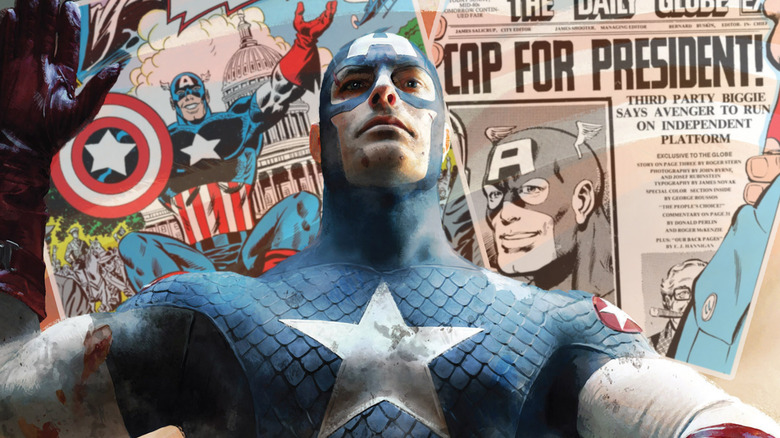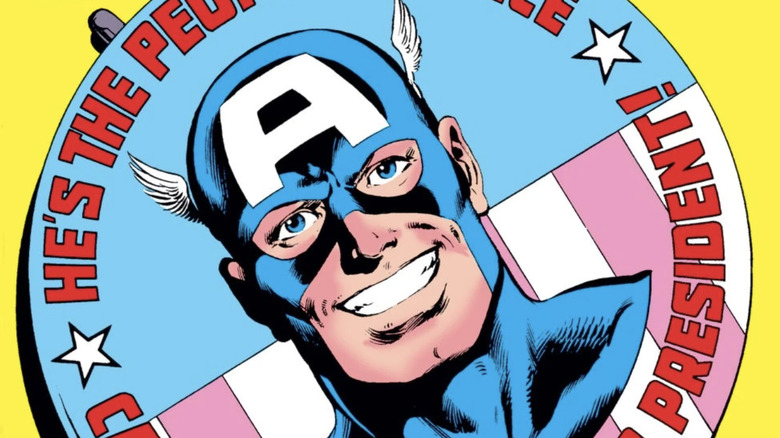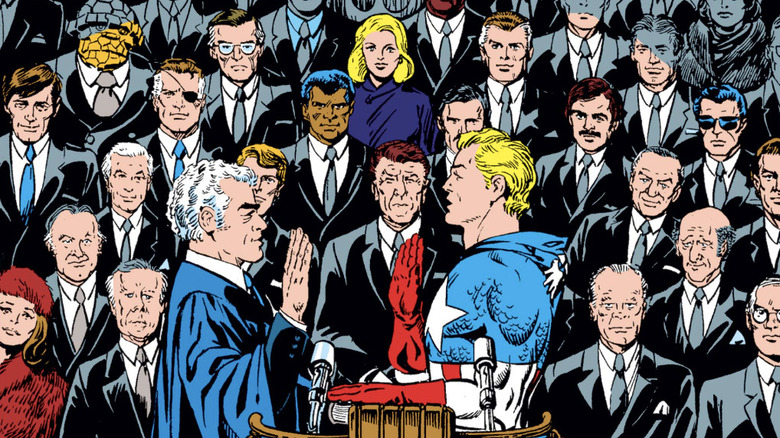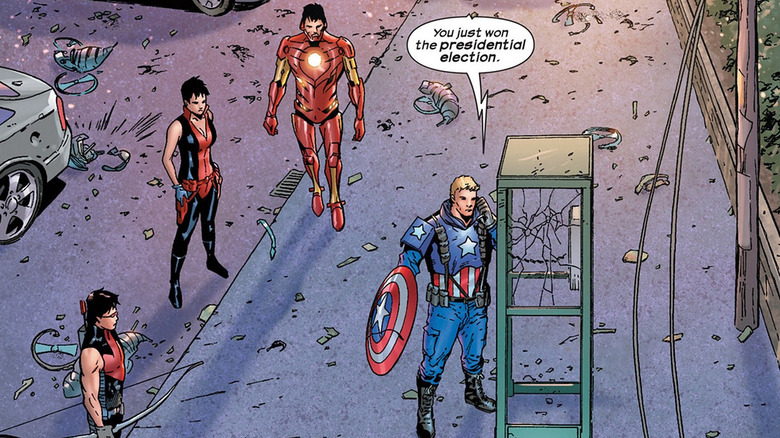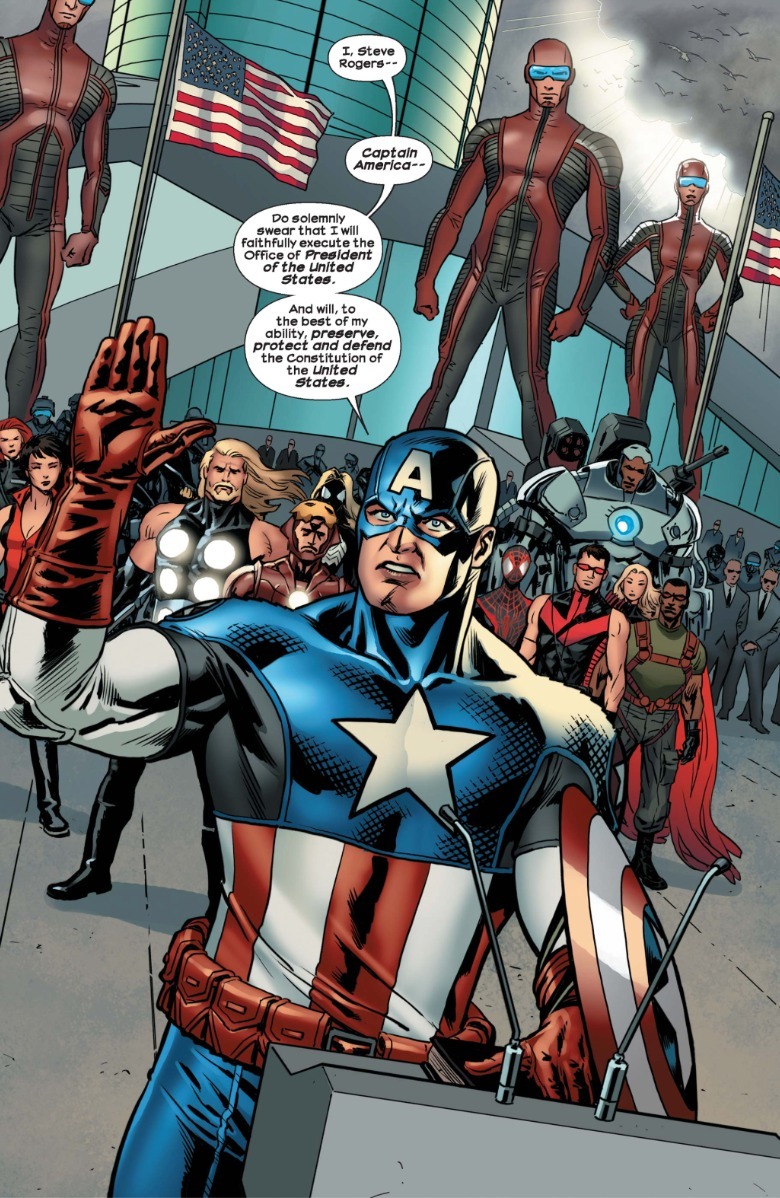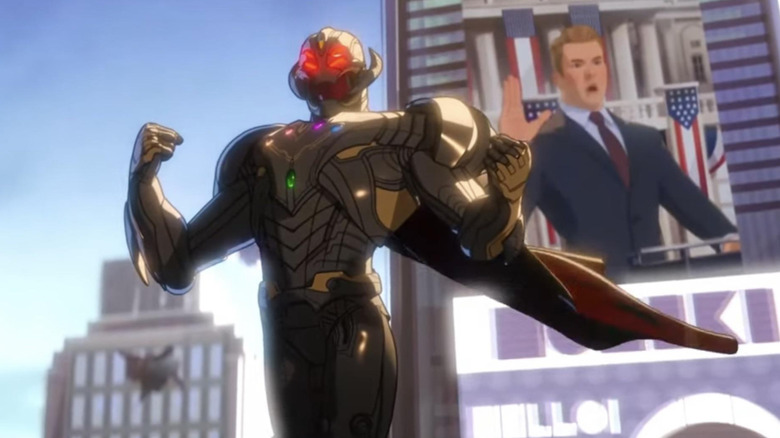Every Time Captain America Has Run For President In Marvel Comics
We may receive a commission on purchases made from links.
Harrison Ford never got a chance to return as President James Marshall in an "Air Force One" sequel ("Air Force Two"?), but he will be playing another president in "Captain America: Brave New World" — President Thaddeus "Thunderbolt" Ross, who was previously played by the late William Hurt in previous Marvel movies. As he did in the comics, Ross will become the Red Hulk, and it looks like he'll be battling it out with Sam Wilson (Anthony Mackie), the new Captain America.
The President of the United States is a shady character? Truly the most outrageous idea in the Marvel Cinematic Universe yet! All kidding aside, between a reactionary, kleptocratic Republican party and a feckless, enabling Democratic one, you might be wishing for a president who would truly, courageously stand up for liberty and justice for all— perhaps someone like Captain America himself. Believe it or not, a few Marvel comics have explored this very idea.
Now, Steve Rogers has palled around with presidents from Franklin D. Roosevelt (who first presented Cap with his mighty shield) to George W. Bush. Yet this is why Marvel usually keeps Cap away from choosing a side of partisan politics — you're inevitably less of a hero to the other side if you commit. In Nick Spencer's run on "Captain America: Sam Wilson," Sam shows this when he decides he can't stay neutral, gives a speech endorsing liberal principles, and winds up roundly criticized by the right.
A character called "Captain America" is also going to represent two very different ideals to different political aisles. In real life, both sides have tried to claim him or head-canoned his affiliation. His whole character is defined by patriotism and American greatness, conservatives might say, so he's one of us. But wait! — liberals attest — Steve Rogers canonically grew up poor in New York City during the Great Depression, so he must be a New Deal Democrat.
Now, Captain America has been mostly written by liberals, and that's how his actor Chris Evans swings too. Yet some have also penned him as a conservative. In Mark Millar and Bryan Hitch's satirical "Ultimates," Ultimate Cap (the one who saluted Dubya) is used to represent what a blue-eyed good ol' boy really is: a thug who shouts things like "Surrender?! Do you think this 'A' on my forehead stands for France?!"
To keep the character above the fray, even Captain America stories where he runs for president have tried to avoid painting him as firmly red or blue.
Captain America #250 features the New Populist Party try to draft Cap
The first time Captain America running for president came up was in Roger Stern and John Byrne's milestone 250th issue of "Captain America," published in 1980. The cover depicts a "Captain America for President" campaign pin, with Steve's smiling face stamped on it.
The issue features the "New Populist Party" trying to draft Captain America to run for president as their candidate. Steve is pretty reluctant, but the idea takes the media by the storm. In the end, Cap gives a public speech declining the candidacy, saying that his duty is to represent the American Dream. Essentially, he's there to be a symbol that other Americans strive towards, and the realities and compromises that being a politician takes run contrary to that.
Sure enough, the issue is purposefully vague about Cap's own political leanings (if he even has any). That's why it's a fictional third party that tries to draft him; the story never infers what the NPP actually stands for (beyond wanting to break up the two-party duopoly), they're just there so the issue doesn't tie Cap to either the elephant or the donkey. "Populist" is a vague description that has been used by both leftists and fascists, but it does suggest someone on the side of the little guy like Cap is. (This is why all factions of the political spectrum try to use it.) Once the idea of Cap running takes off, both the Democrats and the Republicans send letters to Avengers mansion asking him to be their nominee, much like how, in the early 1950s, both parties tried to recruit the real-life American hero of World War 2 — Dwight D. Eisenhower (who, of course, went for the Republicans.)
In the letters page of "Captain America" #250, Stern revealed the backstory of the issue, and also that the idea for it wasn't all his own. A couple of years prior, "Captain America" writer Roger McKenzie and artist Don Perlin came to Stern (who was the book's editor) with a pitch: Captain America would run for president, and win. Then, the next four years of "Captain America" would follow him serving as president in Washington D.C.
Stern dismissed the idea out of hand, saying it would be "too much a distortion of reality." The Marvel Universe is meant to reflect the real world in fundamental ways, like who is currently in the White House. Then, a few years later, when Stern had become the writer of "Captain America" and issue #250 was approaching, he sarcastically suggested they do the "Cap for President" story that McKenzie and Perlin pitched. Marvel Editor-in-Chief Jim Shooter agreed, saying they could use the issue to show why Cap as president wouldn't work. Stern agreed, and the rest (including story credits to McKenzie and Perlin) is written in colored ink.
What If...? #26 shows what happened if Cap accepted the offer
A year later in 1981's "What If...?" #26, Marvel decided to answer what would've happened if Captain America had accepted the NPP's nomination. The story was written by Mike W. Barr and drawn by artists Herb Trimpe and Mike Espositio, but with credits to the original issue's makers. ("Based on an idea by Roger McKenzie & Don Perlin," with "the creative contributions of Roger Stern & John Byrne.")
In this retelling, all goes the same as issue #250 until Cap sees the disappointed faces of his supporters in the crowd, so instead he pledges to not — lose the election! To make up for his own inexperience in government, he picks Senator Andrew Jackson Hawk as his running mate. (Gee, a Black man with a bird-themed name partnered up with Captain America, how novel.) The America-Hawk ticket wins in a landslide, and Cap publicly unmasks himself as Steve Rogers (this was when he still had a secret identity). President Rogers' main policies include moving the U.S. to solar power (with a solar energy-absorbing and redirecting satellite) and sponsoring a rebellion in South American nation San Pedro.
When Cap visits San Pedro, though, he discovers the country's new leader is actually the Red Skull in disguise. The Skull tries to use President Rogers' solar satellite system to attack Washington D.C., but Cap redirects the beam to San Pedro, giving his own life to stop the Skull. The issue concludes with the superhero community attending a funeral for Captain/President America at Arlington National Cemetery.
Ultimate Captain America became President to stop a civil war
The "Ultimate Marvel" universe became a way to tell stories that could distort reality, not to mention break up the Marvel status quo and take out sacred cow characters. During the 2012 "Divided We Fall"/"United We Stand" event in "Ultimate Comics: Ultimates" (written by Sam Humphries, drawn by Joe Bennett) Cap stepped up to bring America back from civil war. No, not that "Civil War."
In "Ultimate Comics: Ultimates" #9, super-villain The Maker vaporizes Washington D.C. with an antimatter bomb, leaving designated survivor Energy Secretary John Howard as the President. Several U.S. states begin to secede, but the sight of Captain America in the news doing his best to save people and hold the country together keeps the flame of hope burning in many Americans. So, without Steve doing any official campaigning, he wins the 2012 presidential election on a massive write-in vote in "Ultimate Comics: Ultimates" #15. (The comic published in September 2012, when a real presidential election was right around the corner.)
Captain America accepts, but even this doesn't change his strategy. His very first act after taking the oath of office (in full costume, with the other Ultimates by his side) is to hop into a fighter jet and go back into the fray; he leaves the administrative work to his chief of staff, Carol Danvers. "My job is to bring America back together," he declares, and he can best do that in the field.
True enough, Cap only stays president for eight issues. At the end of "Ultimate Comics: Ultimates" #24, once the crisis has ended, he resigns the office. "The power is back in the hands of the people, where it belongs."
The MCU's animated What If...? Included a President Captain America cameo
In episode 9 of the animated "Marvel's What If...?" series on Disney+, Infinite Ultron (Ross Marquand) crosses through several different realities with the intent to destroy them like he did his own. In one of these worlds, Steve Rogers (voiced by Josh Keaton standing in for Chris Evans) has been elected President. His inauguration is playing on a jumbotron in the background.
This is just a background detail, but it comes from unused plans for a larger story. In a 2021 interview on Deadline's "Hero Nation" podcast, "What If...? writer and executive producer A.C. Bradley revealed that she and co-writer Matthew Chauncey discussed doing a whole "Captain America as president" episode that would be largely inspired by "The West Wing."
"I wanted the walk-and-talks, the full Aaron Sorkin treatment. It was literally who would be the Josh Lyman? Who would be the C.J. Cregg? We were playing around with it for ages. It was something we did over beers, me and Matt because we're huge Sorkin-heads. But it was the one that hit the cutting-room floor or the idea-room floor. It's a super talky episode, there's not a whole lot of action."
"What If...?" recently concluded after three seasons, and the Captain America "West Wing" episode went unmade. It sounds like a fun premise — but would Captain America as president be as fun as it sounds?
Back in "Captain America" #250, Steve bemoaned: "I can't believe they'd consider running a candidate who has no experience in government." The line feels extra bitter today, but consider that this was 1980 when Ronald Reagan was running. The line between celebrity and politics had already blurred too much.
More recently, famous comic writer Alan Moore has suggested there's a link between the high popularity of superheroes and the global rise of fascism; people have been primed to want a strongman who can do no wrong and solve all problems. Instead, remember the words that Roger Stern spoke through Cap back in the climax of the original "Cap for president" story: "You need but to look within yourselves, to find the people you need to keep this nation strong... and, God willing, to help make the dream come true!"
"Captain America: Brave New World" opens in theaters on February 14, 2025.
